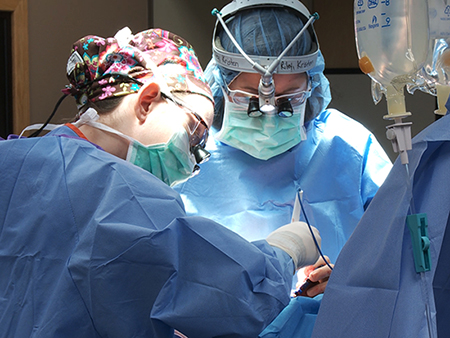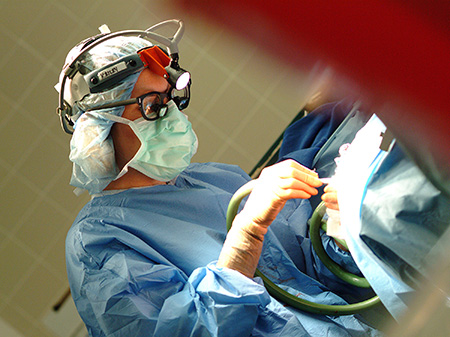Surgery on man’s pituitary tumor ends debilitating migraines
Written by: Emma Shepard
Media contact: Bob Shepard

After 18 months of excruciating migraines, Birmingham-area businessman Christopher Sheheane felt as though he was at the end of his rope. With the migraines came the inability to think clearly, to lead his company, and to be the father and husband he wanted to be.
Because of the accompanying nausea, Sheheane found it difficult to perform regular tasks such as commuting, working, playing with his children, traveling and more. Sheheane and his wife searched high and low for answers, and he even tried an ear piercing that many claimed relieved migraines. Eventually, they sought guidance from a friend who is a physician. He looked at Sheheane’s medical images and knew something was not quite right.
Sheheane then reached out to Mark Hadley, M.D., Charles A. and Patsy W. Collat Endowed Professor in Neurosurgery at the University of Alabama at Birmingham, who had performed a successful tethered spinal cord surgery for him in 2014. On reviewing his case, Hadley recommended that Sheheane see Kristen Riley, M.D., his colleague in the Department of Neurosurgery, for her pituitary expertise.
Sheheane was seen in the Neurosurgical Pituitary Disorders Clinic by Riley as well as Brooks Vaughan, M.D., a professor in the UAB Division of Endocrinology, Diabetes and Metabolism. During the appointment, Riley and Vaughan evaluated Sheheane, performed a series of tests and reviewed his imaging, reading Sheheane’s results with him within an hour of imaging.
Around noon, the diagnosis was clear.
“He had a pituitary tumor that produced excessive growth hormone,” Riley said. “Many of his symptoms, including the migraines, were attributable to this excessive production of growth hormones. We discussed options for treatment, including medical management and surgery. I felt he was a good candidate for surgery, which offered the best chance for a cure.”
This level of care — complex imaging being taken on one floor of the Kirklin Clinic and the results available just hours later on another floor during a single visit — was not what Sheheane was expecting.
“Dr. Riley and her team were incredibly proactive throughout the whole process,” Sheheane said. “Plus, the turnaround time from imaging to meeting with Dr. Riley to break down the diagnosis was so efficient. Dr. Riley was with us, literally, every step of the way.”

After receiving his diagnosis, Sheheane and his wife talked through the recommendation of surgical removal of his pituitary tumor. Ultimately, they decided to follow Riley’s proactive care plan, and Sheheane had the tumor removed the next morning.
Sheheane’s diagnosis of a pituitary tumor-producing growth hormone is called acromegaly. Patients may experience a number of symptoms from acromegaly related to excessive growth hormone. In addition to physical changes from excessive growth hormone, body organ systems are adversely affected as well. It is critical to normalize growth hormone production in order to limit long-term health complications.
Riley performed endoscopic endonasal surgery to remove Sheheane’s pituitary tumor. This involves approaching and removing the tumor through the nose, without any incisions on the face or head. The surgery typically lasts two to three hours, and patients usually spend two nights in the hospital.
As soon as the tumor was removed and recovery began, Sheheane noticed a difference. His migraines subsided and have not returned since his procedure. Sheheane was able to return to his life as a businessman, a father and a husband.
Sheheane’s postoperative endocrine evaluation demonstrated a cure of acromegaly. He continues to have surveillance imaging and endocrine care in the Pituitary Disorders Clinic.
“Dr. Riley quite literally gave me my life back,” Sheheane said. “I was unable to perform even the simplest of tasks, I could no longer work, and life was looking extremely hopeless. I thought it might be that way for the rest of my life, but Dr. Riley has allowed me to be able to live my life again, and live it to the fullest. My entire family is so grateful for Dr. Riley and her team’s excellent care.”




